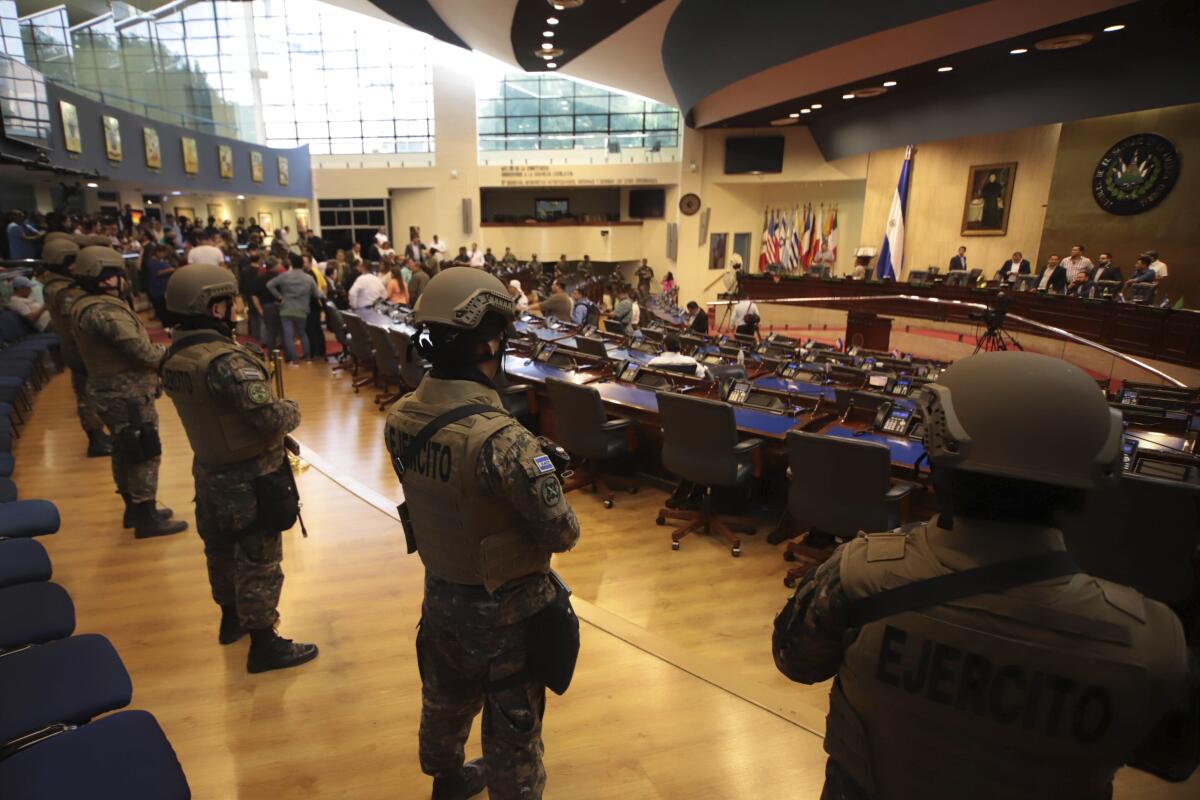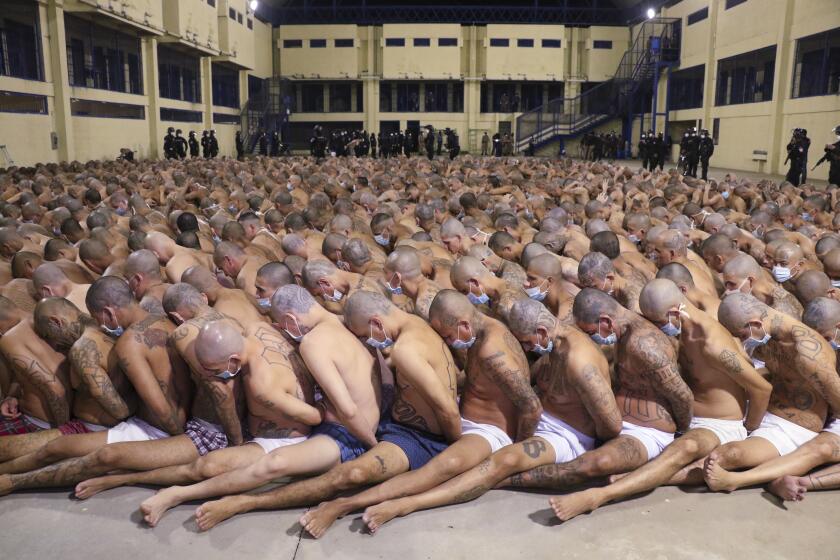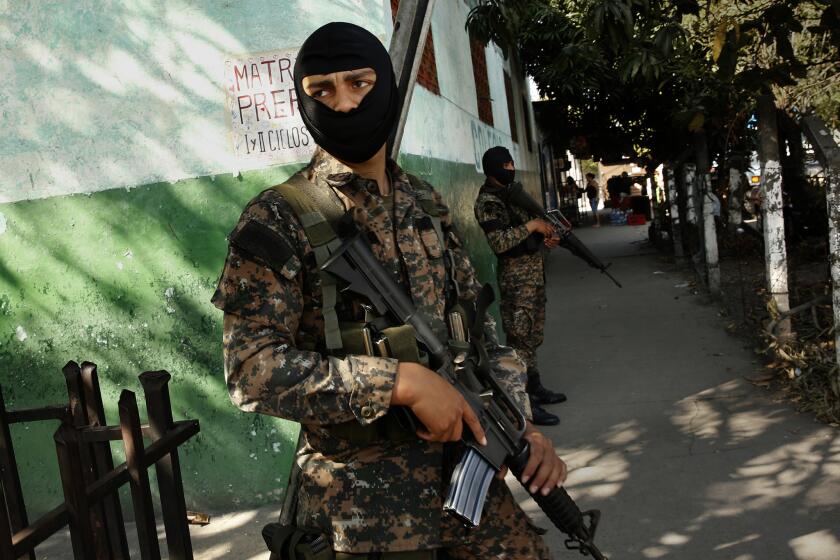U.S. cuts military aid to El Salvador despite intense lobbying by its president

- Share via
MIAMI — The U.S. is slashing foreign military aid to El Salvador despite staunchly pro-American President Nayib Bukele’s intense lobbying in Washington to counter criticism that he has taken his country down an authoritarian path.
Tucked into the omnibus spending and COVID-19 relief bill signed Sunday by President Trump was a provision barring access for El Salvador — and also Guatemala and Honduras — to a State Department program that finances the purchase of U.S. defense equipment.
The ban — which was pushed by Rep. Norma Torres (D-Pomona), the only Central American immigrant serving in Congress — is part of an initiative by House Democrats to strengthen anticorruption efforts in Central America.
Although far greater U.S. security aid channeled through the Pentagon to fight drug-trafficking is not affected, the ban is nonetheless a symbolic blow to the countries as they try to show progress in strengthening the rule of law, said Adam Isacson at the Washington Office on Latin America.
“It basically puts these countries on the same tier as dictatorships and failed states,” said Isacson, an expert on defense spending. “Only a handful of countries aren’t eligible for this program.”
Israel, Egypt and more than a dozen other countries annually receive about $5.6 billion through the State Department’s Foreign Military Financing program to fund purchases of U.S. military equipment and services. El Salvador has received about $15 million through the program since 2016, including $1.9 million this year. Honduras and Guatemala last received such funding in 2018.
Before a single case of coronavirus, President Nayib Bukele placed El Salvador in lockdown and has engaged in other moves that critics say are authoritarian.
Milena Mayorga, who this month became El Salvador’s ambassador in Washington, said she was surprised by the curtailment, which she said goes against decades of close military cooperation between the two countries. El Salvador was one of the few Latin American nations to join the U.S.-led coalition that invaded Iraq in 2003, and the country’s international airport is one of just two in Latin America used by the U.S. military to carry out anti-narcotics missions in the region.
“It’s of vital importance this decision be reconsidered,” Mayorga said. “Our military will always need to have certain tools to fight insecurity.”
Bukele took office in 2019 vowing to rescue El Salvador from the deep divisions left by uncontrolled gang violence and systemic corruption in both right- and left-wing governments that followed the end of a bloody civil war in 1992.
He remains popular at home thanks to a sharp reduction in one of the world’s highest homicide rates. But in Washington, he has drawn criticism from Democrats and some Republicans for strong-arm tactics, such as his decision to send heavily armed troops into El Salvador’s congressional chamber last February to pressure lawmakers into approving a loan to fund the fight against gangs.
Street gangs in El Salvador have turned from extortion and killing to enforcing social distancing restrictions, often with threats and baseball bats.
Mayorga said the traditional parties that have dominated El Salvador’s congress have spared no effort trying to portray Bukele as an autocrat. But she said many of the president’s initiatives, such as inviting the Organization of American States to lead a commission to investigate graft, dovetail with anti-corruption concerns in the U.S. Congress.
“Right now is when we most need the U.S.’ support,” said Mayorga, a popular former TV news anchor who, as a lawmaker, angrily split with her conservative Arena party to back Bukele.
Bukele’s government tried to improve its standing in Washington by signing lobbying contracts worth more than $1.6 million with three different Washington firms since August.
Also included in the federal spending bill is a provision threatening targeted sanctions on government officials in the so-called Northern Triangle countries — El Salvador, Guatemala and Honduras — who are deemed to have undermined democratic institutions. It requires the U.S. president to submit in the next 180 days a public list of corrupt individuals. That is expected to include some of the region’s most powerful politicians, some of whom have been suspected for years of ties to drug traffickers.
Get our L.A. Times Politics newsletter
The latest news, analysis and insights from our politics team.
You may occasionally receive promotional content from the Los Angeles Times.
Foreign aid to Central America has been the subject of much haggling in recent years. Trump in 2019 suspended aid to several countries over the continued flow of migrants from the region.
Bukele managed to resume aid by signing an agreement to allow the U.S. to send asylum seekers from other countries to El Salvador, paving the way for an era of close cooperation with the Trump administration. But even Trump officials in May quietly expressed concern that Bukele’s defiance of El Salvador’s congress and supreme court threatened its eligibility to receive anti-poverty assistance.
President-elect Joe Biden has made Central America one of his foreign policy priorities in the Western Hemisphere. It’s unclear whether he will go along with the decision to curtail military aid to the Northern Triangle. As vice president, he aggressively pushed a $750-million package to the region to attack the root causes of migration — poverty and violence — and as president has vowed to expand aid to $4 billion.
More to Read
Sign up for Essential California
The most important California stories and recommendations in your inbox every morning.
You may occasionally receive promotional content from the Los Angeles Times.















